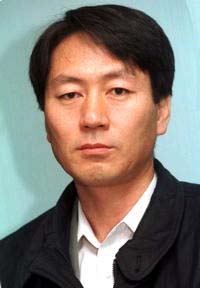 |
|
Han Seung-Dong, Senior Reporter
|
By Han Seung-dong
Senior Reporter for the Hankyoreh
According to recent opinion polls conducted by the Japanese newspaper Asahi Shimbun, only 30 percent of Japanese know about the International Military Tribunal for the Far East; as many as 90 percent of those in their 20s are ignorant of its existence. Naturally, those who don’t know about the tribunal tend to support Japanese prime minister Junichiro Koizumi’s controversial visits to the Yaskuni Shrine. May 3 marked the 60th anniversary of holding the war tribunal in Tokyo, where Japan’s wartime prime minister Hideki Tojo and others honored at the Yaskuni Shrine were convicted of war crimes.
Most of the supporters of visits to Yaskuni Shrine are not only ignorant of the Tokyo war tribunal, but even deny its justification, calling it an abuse by the powers that won World War II. Such an emotion is gaining strength in Japan.
Additionally, recent shifts in U.S. military organization in Japan have both played upon and further fueled Japan’s desire to return to the status of a military power. Two days prior to the May 3 tribunal anniversary, the U.S.-Japan Security Consultative Committee (SCC) adopted a statement urging the two countries to integrate their military strength. Integration of military strength! Japan’s constitution, forced through by the U.S., is dubbed the ‘Peace Constitution." Under Article 9, Japan cannot have armed forces or hold the ability to wage war. An integration of military strength will change all this, and the U.S. has taken the initiative in this case, pressuring Japan to agree to the changes.
When Japanese Foreign Minister Taro Aso severely decried South Korean and Chinese nationalism, his denial of the past reached the level of mental perversion. The issues surrounding the debate are not as simple as Mr. Taro would like.
As disputes over history among Japan, South Korea and China have increased in timbre, some in the U.S. have also expressed discomfort at the attitude of Japan’s conservative rightists. This is a natural reaction, for to support the visits to the Yaskuni Shrine is to deny the findings of the Tokyo war tribunal; this is the same as denying the justification of the so-called U.S.-led post-World War II system. Then, does this recent military development mean the U.S. is being inconsistent? It is vacillating, to be sure, but it is consistently steadfast on one principle: self-interest.
When the U.S. and Japan demand other countries not to ask about their past, the two nations are speaking about matters unfavorable to them. We can clearly see this in the dominant rightist neo-conservatives in Japan’s current administration, who say loudly that we should forget the darkness of history as early as possible and plan a bright future, at the same time sticking to their claims about Dokdo and persistently clinging to the problem of North Korean abductees. The Bush administration’s neo-conservatives now want Japan to amend the constitution to be reborn as a war country; according to them, Japan is an "ordinary" country. How self-contradictory they are!
The South Korean rightists are by no means different. They are exerting their utmost effort to regain power regardless of the future of the nation, while attempting to bury the past, ignoring Japan’s provocation regarding Dokdo and supporting the controversial U.S. military base relocation. The problem is that if they are successful, the nation and society will suffer a loss. We have witnessed this trend for the past 100 years.





